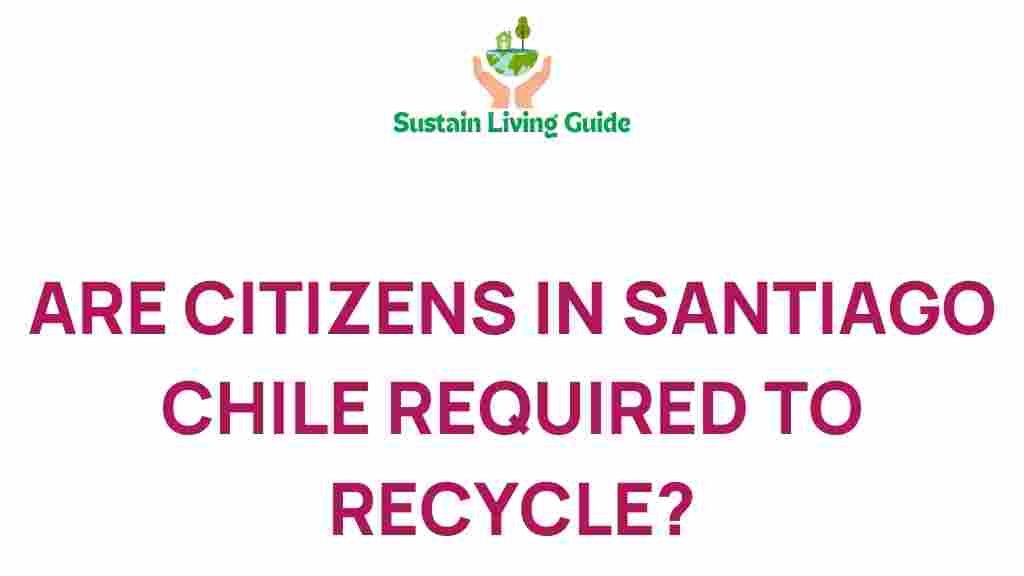Santiago’s Recycling Revolution: Are Citizens Obligated to Join In?
As the world increasingly grapples with environmental challenges, cities like Santiago are stepping up to address waste management and sustainability. The city has embarked on a recycling revolution that raises crucial questions about civic responsibility. Are citizens obligated to participate in this recycling movement? This article explores the significance of Santiago’s recycling initiatives, the responsibilities of its residents, and how everyone can contribute to a greener future.
The Importance of Recycling in Santiago
Recycling is more than just a trend in Santiago; it’s a vital component in the fight against climate change and urban pollution. With a growing population and increasing waste generation, the city faces significant environmental challenges. Here are some key reasons why recycling is essential:
- Reduction of Landfill Waste: Recycling helps divert waste from overcrowded landfills, reducing their environmental impact.
- Conservation of Resources: By recycling materials, we conserve valuable natural resources and reduce the need for raw material extraction.
- Energy Efficiency: Recycling typically consumes less energy compared to producing new products from raw materials.
- Pollution Reduction: Decreasing the amount of waste sent to landfills helps reduce harmful emissions and pollution.
History of Recycling in Santiago
The recycling movement in Santiago has its roots in grassroots initiatives aimed at improving waste management. Over the years, the government has implemented various programs to promote recycling, such as:
- Public Education Campaigns: Informing citizens about the importance of recycling and how to do it effectively.
- Increased Accessibility: Establishing recycling bins throughout the city to make recycling more convenient.
- Partnerships with NGOs: Collaborating with non-governmental organizations to enhance recycling efforts and community engagement.
Are Citizens Obligated to Recycle?
This question is at the heart of Santiago’s recycling revolution. While there may not be a legal obligation to recycle, there is a strong moral imperative. Here’s why:
- Community Responsibility: Each citizen has a role in creating a sustainable environment for future generations.
- Collective Impact: When individuals participate, the collective effort can lead to significant reductions in waste.
- Setting an Example: Engaging in recycling can inspire others in the community to follow suit.
How to Get Involved in Santiago’s Recycling Revolution
Joining the recycling movement in Santiago is easier than you might think. Here’s a step-by-step guide to help you get started:
Step 1: Educate Yourself
Understanding what can and cannot be recycled is crucial. Familiarize yourself with local recycling guidelines by visiting the official Santiago municipality website, which provides comprehensive information on recyclable materials.
Step 2: Set Up a Recycling Station at Home
Create a designated area in your home for recyclable materials. Use clearly labeled bins for:
- Paper and cardboard
- Plastics
- Glass
- Metals
Step 3: Participate in Local Programs
Many neighborhoods in Santiago organize community recycling events. Get involved by:
- Joining local cleanup days
- Participating in educational workshops
- Volunteering for community recycling initiatives
Step 4: Spread Awareness
Share what you’ve learned about recycling with friends and family. Consider hosting a small event to educate others on the importance of recycling in Santiago.
Troubleshooting Common Recycling Issues
Even with the best intentions, mistakes can happen. Here are some common recycling issues and how to resolve them:
Issue 1: Contamination of Recyclables
Contaminated items can ruin entire batches of recyclables. To avoid this:
- Rinse out containers before recycling them.
- Avoid placing non-recyclable items in the bin.
Issue 2: Confusion Over What Can Be Recycled
If you’re unsure about an item, it’s better to check than to guess. Refer to local guidelines or the Santiago recycling app for clarification.
Issue 3: Lack of Participation from Neighbors
Encouraging neighbors to participate can be challenging. Here are some tips to engage your community:
- Share success stories of recycling efforts.
- Organize community challenges to incentivize participation.
- Provide simple instructions on how to recycle correctly.
Conclusion
As Santiago continues on its path toward sustainability, the role of citizens in the recycling revolution cannot be overstated. While there may not be a legal obligation to recycle, the ethical responsibility to contribute to a cleaner, greener city is clear. By educating ourselves, actively participating, and encouraging others, we can collectively make a significant impact on our environment.
Join the movement today and be a part of Santiago’s recycling revolution. Together, we can create a sustainable future for generations to come.
This article is in the category Waste and created by SustainLivingGuide Team
